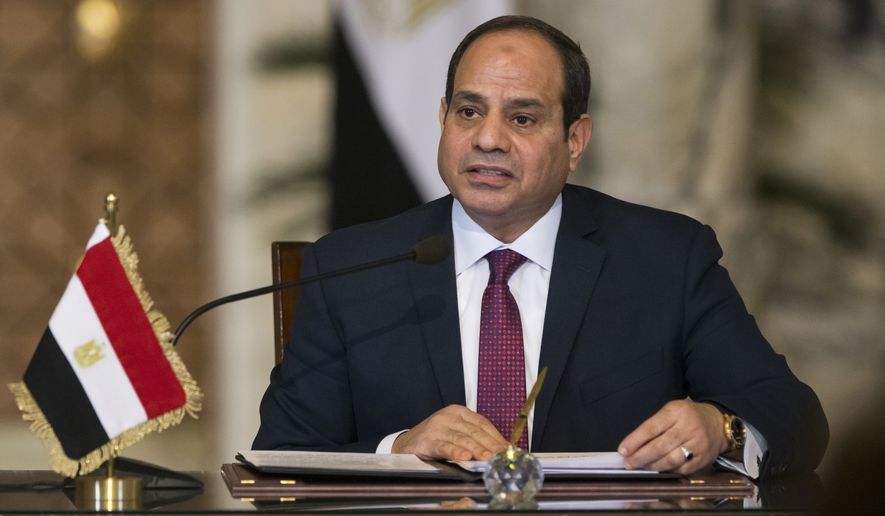CAIRO — President Abdel-Fattah el-Sissi has vowed repeatedly to respect the limits on his power outlined in Egypt’s 2014 constitution.
Drafted in the wake of the 2013 Tahrir Square uprising and the end of the 30-year rule of President Hosni Mubarak, the document limits Egyptian presidents to two four-year stints in office.
But in an era when powerful authoritarians such as Russia’s Vladimir Putin, China’s Xi Jinping and Turkey’s Recep Tayyip Erdogan have extended their tenures as heads of state into the indefinite future, many believe Mr. el-Sissi might try for an extended stay in office himself, with some of his supporters egging him on.
“Let me tell you something: There’s no bigger country than China, and they just changed the constitution to give the president an open term, up to life,” television host Imad Eddin Adib said recently as he called Mr. el-Sissi to do the same.
Such calls among el-Sissi supporters for the third term began weeks before the former army chief’s smashing re-election victory in March, when he racked up 97 percent of the vote in a contest that human rights monitors and others said was an authoritarian referendum rather than an honest ballot.
There are questions that consume Egyptian politics and loom over the entire region for days. Having amassed so much power after the disruptions of the Arab Spring, what does the president plan to do with it? And how legitimate and lasting will be the mandate he now claims?
Mr. el-Sissi’s huge election win last month reflected a boycott by opposition activists after authorities imprisoned three presidential candidates from the military and four potential civilian candidates opted not to run. Turnout was 42 percent, 6 percentage points less than when Mr. el-Sissi won his first term in 2014.
Despite his grip on power, Mr. el-Sissi’s re-election campaign faced some significant headwinds.
He has had to devalue the Egyptian pound and reduce food and fuel subsidies to meet the terms of an International Monetary Fund bailout of the state coffers. At the same time, violent Islamic State terrorists have been fighting the Egyptian army in northern Sinai for five years while targeting Coptic Christians in the Nile Valley.
Many Egyptians feel they need a strong leader to deal with those threats.
“Let’s be honest with ourselves. We are pharaoh’s people, and we’re looking for the one man, the only man, who achieves great things and can face the security challenges,” said Mahmoud Ibrahim, managing director of Egypt Campaigns, a Cairo political consulting firm that worked for Mr. Mubarak, a former defense chief who lost the presidency when he was driven from power by the popular protests of 2011.
Mr. el-Sissi has launched massive projects to jump-start economic development and showcase his leadership, including a planned new capital city about 30 miles east of Cairo, massive desert reclamation projects and urban redevelopment in Cairo’s sprawling slums.
“The opposition people are busy on Twitter, but you cannot find another man to build this country,” Mr. Ibrahim said.
Mr. el-Sissi, a former army field marshal and head of military intelligence, has been reluctant to appear as a party politician. He announced his candidacy in 2014 within weeks of the deadline for filing and did not personally appear at any of the pre-election rallies organized by his campaign.
Now, however, as he has cracked down on civil rights and eliminated rivals, nobody else appears ready to challenge him.
“Speculation that the president will remain for more than his constitutional term is often raised by political parties because there is no real alternative who enjoys the same popular consensus, or matches the broad support Mr. el-Sissi obtained in the last two elections,” said Mustafa Kamal, an analyst at the government-affiliated Al Ahram Center for Political and Strategic Studies.
Amending the constitution to permit a third term requires legislation by parliament and approval in a popular referendum.
But Mr. Kamal said parliament needs to clarify laws governing how political parties operate before Mr. el-Sissi considers making those changes. Security officials have oversight of parties, and complex regulations make political organizing difficult. El-Sissi loyalists want to reform the system so it includes only two major parties.
Opposition groups say both the current system and the proposed changes are unconstitutional and exemplify Mr. el-Sissi’s authoritarian streak.
Proponents insist that the reforms would allow room for loyal opposition groups — broadly defined in Egypt as supporters of the drive in 2013 to oust Muslim Brotherhood-backed President Mohammed Morsi by street protesters and the military — to contest local elections slated for next year.
While Western governments are concerned about Egypt’s political trajectory — British Prime Minister Theresa May went so far as to remind Mr. el-Sissi of term limits in her congratulations call after he won in March — multinational companies are showing signs of supporting his economic policies.
“He is weaning this country from the socialist dogma that we had since the 1960s,” said Tarek Tawfik, president of the American Chamber of Commerce in Egypt. “American multinationals in Egypt already are reinvesting and expanding here.”
Virginia-based candy maker Mars is moving its manufacturing facilities from Dubai in the United Arab Emirates to Egypt, for example, Mr. Tawfik said.
“They realized that as a cost base and as a cost center, it’s far more economical to be here,” said Mr. Tawfik. “We have free trade agreements with most African countries, all the Arab states and the European Union. Companies are looking at Egypt as a regional hub, a logistical and transport center with cheap and trainable labor with access to energy for years to come.”




Please read our comment policy before commenting.